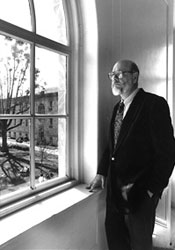Tribute to Dr. James W. Fowler
By Kathy Kinlaw, Associate Director, Ethics Center

Dr. James W. Fowler, beloved director of the Emory Ethics Center from 1994 until his retirement in 2005, died peacefully, surrounded by family, on October 16, 2015.
Jim was a pioneering scholar in practical theology and ethics, building on cognitive development theory and extensive empirical research as he identified six stages of faith through which we move as we seek meaning in our lives. His book Stages of Faith: The Psychology of Human Development and the Quest for Meaning, was formative in a field in which research and scholarship continue to evolve internationally.
He was also a kind and thoughtful colleague, as well as loving husband and father, who lived a life full of meaning and faith. Even as he lived with Alzheimer’s Disease in recent years, he maintained this core dignity.
Jim grew up in North Carolina, moving between towns with his United Methodist minister father, before his family settled at Lake Junaluska, home of the Methodist conference center. He attended Duke University and Drew Seminary, then received his PhD in Religion and Society from Harvard University and pursued postdoctoral studies at the Center for Moral Development at the Harvard Graduate School of Education. Jim taught at Harvard Divinity School and Boston College before joining the faculty of Emory's Candler School of Theology in 1977. He was named the Charles Howard Candler Professor of Theology and Human Development in 1987. An ordained elder in the United Methodist Church, at Emory he directed the Center for Research on Faith and Moral Development, before joining the Ethics Center as director in 1994.
Jim wrote or edited 11 books and numerous book chapters and articles. In 2003, he was presented with a Festschrift to which 15 scholars contributed, Developing a Public Faith: New Directions in Practical Theology.
He was a man of deep, abiding faith and a wonderful teacher and mentor for so many students and colleagues through the years. The Ethics Center is grateful for his enduring vision.
Related Stories
- Emory News Center Memorial Planned for James Fowler, Theologian and Former Center for Ethics director
- Remembering James Fowler—by Steven M. Tipton, Candler School of Theology
- James W. Fowler, 75: Theologian, Author ‘embodied the faith he studied’—Atlanta-Journal Constitution
- A Tribute to James Fowler—Bioethics.net
- Obituary
- Atlanta-Journal Constitution Legacy Announcement